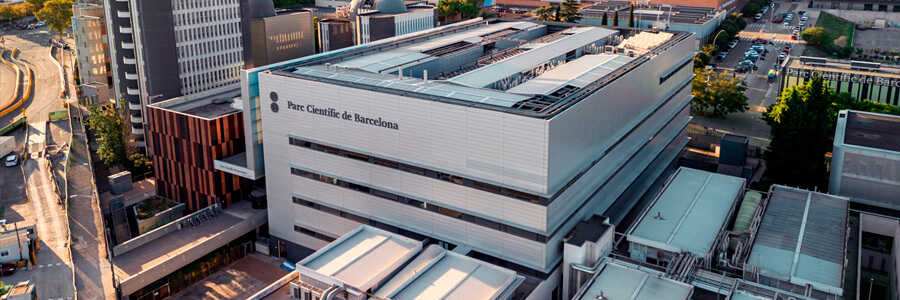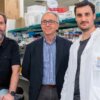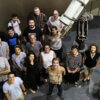
Barcelona Science Park companies break record after raising €142M in 2022
2022 has been a historic year in economic and innovation indicators for the entrepreneurial ecosystem of the Barcelona Science Park (PCB). The funding raised by the companies that form part of the PCB Community, in transactions identified in 2022, reached €142M, an absolute record, of which €85M (58%) came from private capital. This figure, which reflects the consolidation of the life science sector in Catalonia, comes in the year the University of Barcelona celebrates the 25th Anniversary of the PCB Foundation.
These data imply a four-fold growth in the funding achieved in transactions identified in 2021, the year in which the companies installed in the Park carried out transactions for the value of €39M. Just one year later, individual transactions have closed that already exceed this accumulated amount in 2021. This is the case with SpliceBio, a biotechnology company for gene therapy based on technology developed at the University of Princeton, which leads the Park ranking in the amount raised in rounds.
Private funding
The ‘deep tech’ SpliceBio raised €50M, the highest third round in 2022 registered in the BioRegion, the largest series A raised by a biotechnology company in Spain and the highest round ever for a company based at the Science Park. It was recognised as “Series A of the year” at the European Lifestars Awards. The transaction was co-led by UCB Ventures (Belgium) and Ysios Capital (Spain) with the participation of New Enterprise Associates (NEA, United States), Gilde Healthcare (the Netherlands), Novartis Venture Fund (Switzerland) and Asabys Partners (Spain).
The second round in amount was closed by DeepUll which continues its gradual growth combining public and private financing. The company which specialises in the development of affordable culture-free diagnostic solutions for the early identification of sepsis and other acute infections, raised €13M in a Series B round to progress in the early detection platform for sepsis. The transaction was led by Innvierte (Ministry for Science and Innovation of Spain – CDTI), and a strategic investor that has not been made public, as well as the pre-existing participation of Kurma Partners, Alta Life Sciences, UI Investissement (advised by Mérieux Equity Partners) and Axis Participaciones Empresariales. In 2022 DeepUll also received a €20M loan from the European Investment Bank (EIB).
In 2022 Pangaea Oncology, connected to Barcelona Science Park as an associate company, has carried out one of the most relevant transactions this year in the Spanish stock market BME Growth. The company, leader in precision oncology medical services, has secured €12M through two capital increases. The new shareholders have been led by relevant institutional investors.
Standing out within the group of companies that raised between €1M and €3M in private funding are: Newborn Solutions (€2.7M); CIRCE Scientific (€1.71M), GAT Biosciences (€1.33M) and GAT Therapeutics (€1.5M). Other companies in the Park that achieved an investment of less than €1M are Bioliquid and IDP Pharma.
“The Park continues positioning itself, with the activity it generates, as a fundamental part of the Diagonal Health Hub. The figures of strong growth in financing and investment carried out by our entities are a sign of the trust and commitment to these projects, most of which portend a very hopeful future for the whole health ecosystem, starting with industry and ending with the patient. I also want to highlight the success of SpliceBio, a company that is strongly connected to the Park, which has become the highest third round in a territory as competitive on a European scale as the BioRegion”, explains Maria Terrades, director of the Barcelona Science Park.
Public funding
Various companies in the Park turned to public funding in 2022 through regional, national and European tenders for aid, to considerably expand their financing capacity.
This is the case with INBRAIN Neuroelectronics, a spin-off of the Catalan Institute of Nanoscience and Nanotechnology (ICN2) and ICREA, which was chosen to receive funding from the EIC Accelerator programme of €17.5M for its role as a strategic company for Europe’s Healthcare Innovation. The investment will support the development and marketing of its graphene neural interface.
Aptadel Therapeutics, a pre-clinical company co-funded by IDIBELL developing the first therapy based on RNA nanoparticles against the childhood cancer, Ewing’s Sarcoma, raised €3.65M in public funds in 2022: €1.87M from a Eurostarts grant (EUREKA programme and Horizon 2020 from the EC) and €1.78M aid from the Ministry for Science and Innovation through the State Programme of R&D&i Aimed at Society Challenges of the State Research Agency (AEI).
For its part, Gate2Brain, a spin-off of the University of Barcelona (UB), the Institute for Research in Biomedicine (IRB Barcelona) and the Sant Joan de Déu Research Institute (IRSJD)- Sant Joan de Déu Hospital (SJD)– received a total of €3.12M in public funding in 2022 to boost the preclinical regulatory stage of its drug G2B-002, targeted at brain tumours with intact barriers: €2.5M from the EIC Accelerator programme; and other aid from the CaixaResearch Consolidate call of “la Caixa” Foundation and the Neotec programme of the Centre for the Development of Technology and Innovation (CDTI).
Other outstanding transactions of companies installed at PCB involved Newborn Solutions -focussed on the development of a first-in-class device for the non-invasive detection and monitoring of childhood meningitis and other infections in serous body fluids- which obtained €3.48M: €2.5M from the EIC Accelerator programme, and other contributions from the Bill & Melinda Gates Foundation, and the Listen2Future project, a KDT JU (Key Digital Technologies Joint Undertaking) within the Horizon Europe programme.
Other companies that raised between €1 and €3M are: OneChain (€3M); Oxolife, (€2.4M), MiMARK (€1.2M), IDP Pharma (€1.2M), GAT Therapeutics (€0.8M), Roka Furadada (€0.8M) and Dan·na (€0.4M). Three of these companies: OneChain, MiMARK and Dan·na are part of the BCN Health Booster accelerator, created by the Park in 2021 with the collaboration of Barcelona City Council, Barcelona Activa and Biocat. And among those that won public tenders for less than 1M it is necessary to mention CIRCE Scientific (€0.6M), Bioliquid Innovative Genetics (€0.5M), Nuage Therapeutics (€0.2M), GAT Biosciences (€0.2M) and Pharmacelera (€0.2M).
Consultancy firms and venture building
For its part, the consultancy firm GENESIS Biomed contributed to the creation of 2 new startups and spin-offs (Anais Medical and RetinaReadRisk) and helped close two rounds of funding for another two that were already incorporated (Mowoot and Thytech) for €1.6M. Also, in 2022 with FI Group and Crowd4Ventures, to continue GENESIS Ventures funds, currently in a divestment phase, the company incorporated its second vehicle, GENESIS Tech Transfer Boost, with €1M for the next 4 years and aimed at early stage projects in the field of healthcare research. In 2022 it was recognised with the Best Biomedical Consultancy Firm Award at the 11th edition of the “El Suplemento National Awards” and closed the year with a turnover growth of 28% compared to the previous year.
Finally, in 2022 Arian Internacional, a strategic consultancy firm in internationalisation and European funding for innovation, specialising in technology startups, advised 23 startups and SMEs, 75% of which led by women, working on the development of their strategy of international growth and access to European funding (EIC Accelerator, EIT Health, Eurostars, Innowwide and WomenTech EU). The results of the advised companies in the biotech sector, 11 in total, have been very positive, obtaining more than €5M in public grants and €16M in venture capital.
Success stories
US biotech company VeriSIM Life, a global benchmark in next-generation computational platforms for drug development, acquired the start-up Molomics Biotech, owner of a patented deep technology that combines human collective intelligence with artificial intelligence (AI) to design new therapeutic molecules. Created in 2015 by Jascha Blobel (CEO), Giovanni Cincilla (CSO) and Simone Masoni (CTO), the majority of its capital was held by the founding team, which ensured agile execution of its business plan and maximised return for investors.
For its part, the Schülke Group, a world leader in infection prevention for more than 130 years, acquired Vesismin Health. The company was founded in 2004 by entrepreneur Víctor Vallés, fruit of a project incubated at IQS (Institut Químic de Sarrià). Since then, its main objective has been to collaborate with hospitals and health centres in the fight against healthcare-associated infections (HCAI).
From the lab… to the market
Endor Technologies, a biotech company dedicated to biomedical research in oncology and dermatology, expanded its skin care line of more than 20 products in 2022 with the launch of Lasergen. This revolutionary treatment is formulated with the maximum concentration of its Active Hyaluronan molecule, a patented active ingredient of gold nanoparticles with hyaluronic acid (HA) oligomers that activate the CD44 gene receptors (triggering the production of collagen, elastin and HA). Lasergen helps prevent post-inflammatory hyperpigmentation in patients treated with ablative lasers.
In 2022, Roka Furadada, which joined the PCB that same year, launched its first smart molecule on the market, ROKA Smart UV® PvB 360, which offers tailored photoprotection by adapting to the intensity of the solar radiation it receives. It is the first product with ROKA Smart UV® technology, designed to reinforce protection in the UVA spectrum. This technology has developed compounds that are able to transform themselves into new structures that provide high, long-lasting and adaptive photoprotection in the face of environmental conditions. In addition to its use in cosmetic formulas and for sun protection, researchers are exploring its use in the photoprotection of materials.
In terms of licensing, Syna Therapeutics, a joint venture between Reig Jofre and Leanbio, signed a worldwide licensing agreement with Intas Pharmaceuticals to commercialise its biosimilar drug LB-0702 for the treatment of pathologies in the field of haematology. LB-0702 was developed using the technological platforms of the CDMO Leanbio, located in the PCB. One of this organisation’s major breakthroughs during 2022 was its capability to produce up to hundreds of grams of biotherapeutic products.
Accure Therapeutics, a privately held translational neuroscience R&D company, and Oculis, a global ophthalmology company, announced a licensing agreement granting Oculis exclusive global rights to the development and commercialisation of ACT-01, a potentially disease-modifying therapy to protect and prevent damage to the optic nerve and retina.
IDP Pharma licensed IDP-602, a first-in-class drug for ophthalmic diseases, to a US biotech. The compound was developed thanks to the INTRAMETICS platform, a unique technology that makes it possible, for the first time, to design drugs aimed at a new class of therapeutic targets: IDPs (intrinsically disordered proteins).
In 2022, SOM Biotech signed a licensing agreement with the University of Minnesota following the completion of a sponsored research agreement (SRA) signed in 2019, in which the University of Minnesota conducted a series of in vitro studies on potential preclinical product candidates for Duchenne and Becker muscular dystrophy, identified through its proprietary technology platform SOMAIPRO.
Pharmacelera, which specialises in the development and application of disruptive computational chemistry solutions for drug discovery based on quantum mechanics (QM), machine learning (ML) and high-performance computing (HPC), signed an agreement with a Silicon Valley investor for the launch of its brand in the United States. The aim in this strategic area of the globe is to increase its turnover, which in 2022 had already increased by 70% over the previous year, by five over the next three years.
Clinical trials
In the field of new therapies and diagnostic devices, the 2022 pipeline featured the ongoing clinical trials of a large number of companies with ties to the PCB.
Aelix Therapeutics published an article in Nature on the positive results from the AELIX-002 trial, a phase I clinical trial of its therapeutic HIV vaccine. It is currently conducting a second phase II clinical trial, AELIX-003, in collaboration with Gilead to assess the HTI vaccine in combination with Gilead’s experimental Toll-Like 7 (TLR7) receptor agonist, vesatolimod, in people with HIV receiving antiretroviral therapy.
During 2022, the pharmaceutical company Hipra was working to obtain the registration of Bimervax, the first Spanish vaccine against SARS-CoV-2, and the first one developed 100% in the European Union using recombinant protein technology. In 2022 the company was awarded the Creu de Sant Jordi for this project, which involved the team at its R&D centre at the PCB, as well as for its commitment to global health and more than 50 years’ experience in the fight against communicable diseases through the development of vaccines. As of April, Bimervax can now be marketed in the European Union, after having received a favourable opinion from the European Medicines Agency and having obtained authorisation from the European Commission. It is the first bivalent, adjuvanted recombinant protein vaccine licensed in the EU against the virus.
In 2022, Newborn Solutions completed phase I (proof of concept) for Neosonics, a first-in-class medical device for the non-invasive detection and monitoring of infant meningitis and other infections in serous fluids. Neosonics was validated in an international clinical trial involving three hospitals in Spain and two centres in Mozambique. The results showed 100% sensitivity, 90% specificity and 92% accuracy in vitro. In 2023, the Hôpital de Enfants de Rabat (HER) joined the project for the phase II trial to assess its efficacy after receiving authorisation from the Moroccan Ministry of Health. 2022 also saw major advances in the development of applications of the device for uveitis (clinical phase) and peritoneal dialysis (preclinical).
The biopharmaceutical company SOM Biotech, specialised in the identification, development (in preclinical and clinical phases) and commercialisation of drugs for the treatment of orphan diseases mainly related to the central nervous system, continued to advance in the clinical development of the compounds SOM3355 (Huntington’s disease), SOM1311 (phenylketonuria) and SOM0061 (COVID-19), in phase II, and of SOM3366 (dyskinesia) and SOM0777 (glioblastoma), in phase I.
OneChain Immunotherapeutics (OCI) obtained authorisation from the Spanish Agency for Medicines and Medical Devices (AEMPS) to conduct the CARxALL clinical trial, unique in the world, to assess a new CAR-T therapy in patients with a subtype of T-cell leukaemia with no therapeutic alternatives.
One year after the start of its international phase IIa clinical trial, OXOART-2, to assess the efficacy of the drug OXO-001, which acts on embryo implantation to increase pregnancy success rate, in September 2022 Oxolife achieved the first nine births in the three countries participating in the study.
Cutting-edge R&D&I
In earlier stages of R&D, the companies in the PCB community made very relevant advances in the preclinical phases of products and solutions in the development, validation, proof-of-concept or regulatory stage, where they have not yet begun to be tested in humans.
In 2022, CIRCE Scientific, specialising in the use of co-crystallisation technology to develop optimised nutriceutical ingredients focused on longevity and healthy ageing, began the industrial scale-up of Pterovita. This proprietary co-crystal of picolinic acid and pterostilbene combines two or more distinct molecules to create a structure with enhanced physicochemical properties compared to the individual components. It is both an ingredient and a science-based solution for the dietary supplement, food and beverage, animal health, cosmetics and pharmaceutical industries.
Gate2Brain continued to advance preclinical development – with intratumoural pharmacokinetics characterisation in in vivo experimental models – of its drug G2B-002, targeting barrier-intact paediatric brain tumours, such as diffuse intrinsic pontine glioma (DIPG). The company, a spin-off of IRB Barcelona, the University of Barcelona and Hospital Sant Joan de Déu, has designed an innovative patented technology based on peptides with the ability to cross the blood-brain barrier to combat this devastating condition, the most aggressive paediatric CNS tumour.
In 2022, Endor Technologies started the regulatory phase prior to the phase II clinical trial for a revolutionary immunotherapy for pancreatic and colon cancer. Its radical innovation is that it does not act on the biological qualities of the tumour cells, but on the way in which the tumour grows, so it is not able to generate resistance and enters a state of cell death.
IDP Pharma partnered with a European pharmaceutical company to jointly develop IDP-601, a first-in-class drug targeting intrinsically disordered proteins (IDP) that cause respiratory diseases. The partner is responsible for developing IDP-601 in the preclinical and formulation stage prior to entering into a licensing agreement. The company also published a study, in collaboration with the Instituto de Salud Carlos III (ISCIII) and Hospital 12 de Octubre in Madrid, in the journal Neurotherapeutics, which revealed that its new experimental drug IDP-410 directly interacts with the N-Myc oncoprotein and reduces the growth of glioblastomas in animal subjects.
MiMARK, a femtech that wants to revolutionise the diagnosis of endometrial cancer with a minimally invasive in vitro molecular diagnostic test, WomEC, has already reached the prototype development phase, and expects to initiate clinical validation studies of the product in 2023. WomEC is being developed as an immunoassay test to facilitate its implementation in clinical laboratories. Its major breakthrough in 2022 was the transfer of technology from mass spectrometry to immunoassay technology.
The deep-tech company NIVD, which focuses its activity on nanotechnology applied to the field of diagnostics, is one of the start-ups that in 2022 chose the PCB as a strategic point to centralise its RDI activity. The company has developed and patented a disruptive technology that allows it to design nanosensors trained to detect diseases in real time before the first symptoms appear.
Finally, Pharmacelera, a deep-tech company specialised in the development and application of disruptive computational chemistry solutions based on quantum mechanics (QM), machine learning (ML) and high-performance computing (HPC) for drug discovery, developed a new product, exaScreen, to explore libraries of billions of molecules. The tool has unmatched accuracy in screening ultra-large synthesisable chemical libraries with innovative virtual screening software, which fuses AI and QM technologies to discover new and multiple hits in unknown chemical spaces. The company expects to launch the software on the market in 2023.




